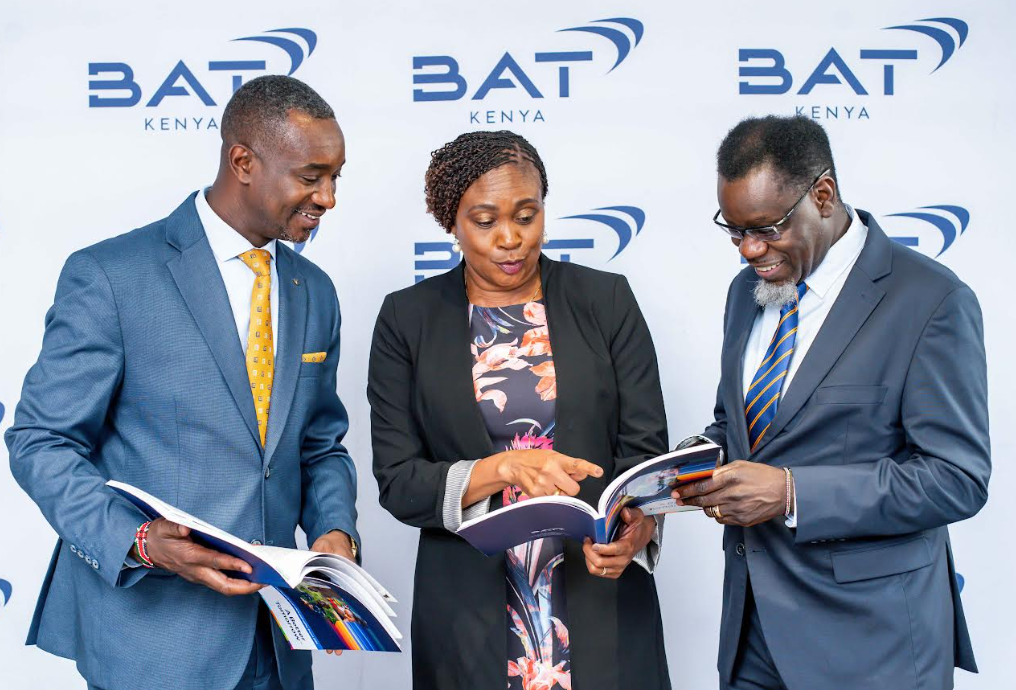
 BAT Kenya finance director Philemon Kipkemoi, chairperson Rita Kavashe and MD Crispin Achola during the launch of the company’s sustainable report/ HANDOUT
BAT Kenya finance director Philemon Kipkemoi, chairperson Rita Kavashe and MD Crispin Achola during the launch of the company’s sustainable report/ HANDOUTtitle: BAT hits 69% mark on women in senior leadership, halves emissions
BAT Kenya has achieved a 69 per cent representation of women in senior leadership, becoming one of the leading companies on gender parity, amid sustained progress on its sustainability priorities.
The tobacco manufacturer, which has surpassed its 2025 target of 45 per cent on women's inclusion, has also reported the training of 208 women in its contracted tobacco farming community on financial literacy, as part of the company’s Sh10 million multi-year Rural Women’s Development Programme (RuWDeP).
To enhance sustainable agriculture and farmer livelihoods, BAT Kenya reports that over 98 per cent of contracted farmers grew alternative crops last year, including maize and avocados, according to its 2024 Combined Annual and Sustainability Report.
On environmental management, it has reported 54 per cent reduction in Scope 1 and 2 emissions in 2024, surpassing its 2030 target to reduce these emissions by 50 per cent (verses 2020 baseline).
Scope 1 emissions are direct emissions from sources owned or controlled by a company, like those from company-owned vehicles or industrial processes, while Scope 2 are indirect emissions from purchased electricity, steam, heat, or cooling consumed by the company, even though those emissions occur at the energy provider's facility.
According to management, the performance is supported by a decarbonisation strategy which aims to achieve 50 per cent of the company’s energy use from renewable sources by 2030.
As such, the company invested Sh145 million in solar energy between 2021 and 2022, increasing its onsite generated electricity to 1,400-kilowatt peak.
“We are proactively taking a leading role in tackling some of the most salient sustainability issues globally and in our communities. We strive to create a meaningful impact in the communities where we operate and inspire all our people to drive change,” BAT Kenya managing director and general manager, BAT East and Southern Africa, Crispin Achola, said.
The company also remains a major contributor to Kenya’s economic growth, including through investments and payments.
Over the last six years, it has contributed over Sh100 billion to national revenue in the form of various taxes (excise duty, VAT, Pay as You Earn and corporation tax, the report indicates.
Top companies
in Kenya, mainly Nairobi-Securities Exchange listed firms, have been increasingly
hiring women and placing some at the centre of decision-making in the
boardrooms, amid a continued
push for gender equity at workplaces.
Other corporates that have made major strides include Safaricom, Co-operative Bank of Kenya, KCB Group and Absa Kenya, all which have crossed the 40 per cent mark on the proportion of women in senior leadership positions.
The progress has come on the back of these firms implementing policies and practices that promote gender equality, including equal pay for equal work, generous maternity and paternity leave, flexible working hours for new mothers and offering opportunities for advancement and leadership for women.
UN Women Africa however notes more needs to be done as equality remains in most parts of the economy, with Kenya ranking of 75th out of 146 countries in the Global Gender Gap Report 2024.
“This shows there is still much work to be done. Women make up a significant portion of the workforce, yet they remain underrepresented in leadership roles and are often paid less than men,” the UN agency said in a recent report.
Global Compact Network Kenya executive director Judy Njino believes that closing the gender gap could lead to massive financial benefits, with studies suggesting that equal participation of men and women in the economy could add up to $28 trillion to the global GDP by 2025.
BAT began operations in Kenya in 1907. It has been listed on the Nairobi Securities Exchange (NSE) since 1969. The company has over 6,200 shareholders (June 2025), of whom around 6,050 are locals.
It is in the business of tobacco farming and processing, manufacturing, import, sale and export of cigarettes, tobacco and nicotine products, with a manufacturing plant in Nairobi and a green leaf threshing plant in Thika.
This is a strategic manufacturing hub for the BAT Group, exporting more than 65 per cent of its output to eight countries in Africa.
The Company’s tobacco growing operations partner with approximately 1,800 contracted farmers in the counties of Bungoma, Busia, Migori, Meru and Homa Bay, generating direct and indirect employment opportunities for more than 80,000 Kenyans.












